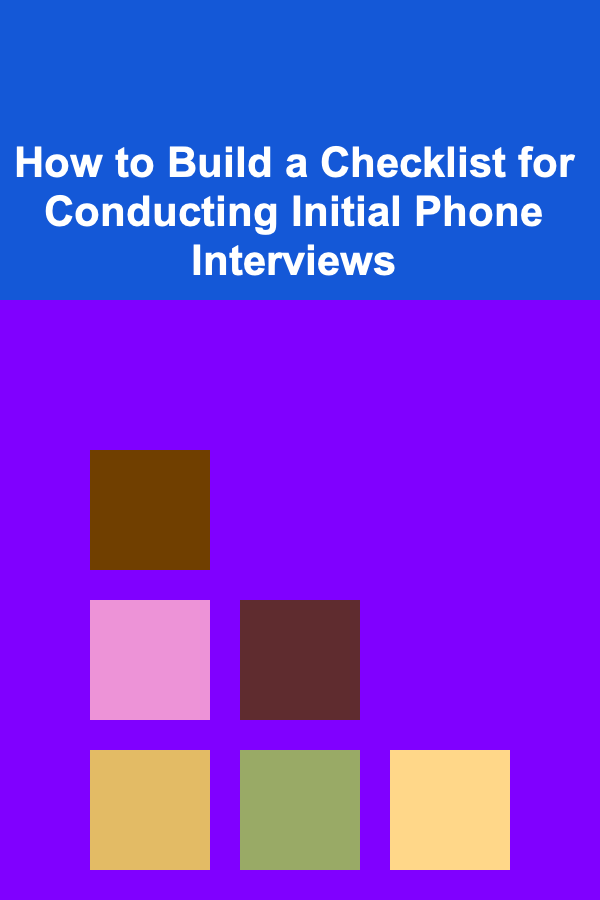
How to Build a Checklist for Conducting Initial Phone Interviews
ebook include PDF & Audio bundle (Micro Guide)
$12.99$9.99
Limited Time Offer! Order within the next:

Conducting effective initial phone interviews is crucial for the hiring process, as it sets the stage for selecting the best candidates for further in-person or virtual interviews. It allows you to gauge a candidate's qualifications, communication skills, and fit for the role before committing to a more detailed, time-intensive interview. A well-constructed checklist helps you stay organized, ensures you ask the right questions, and prevents overlooking important details. Here's a comprehensive guide on how to build an actionable checklist for conducting initial phone interviews.
Understand the Purpose of the Initial Phone Interview
Before creating a checklist, it's important to define the purpose of the initial phone interview. Generally, the main objectives are to:
- Screen the candidate for qualifications and fit.
- Assess communication skills.
- Gather more details on their resume and work experience.
- Determine if the candidate's expectations align with the role and your company.
The phone interview serves as an opportunity to quickly eliminate candidates who are not suitable for further interviews, while also identifying those who might be a great match for your team. Your checklist will be shaped by these objectives.
Structure Your Checklist for Different Phases
An initial phone interview usually involves three phases: introduction, information gathering, and closing. Structuring your checklist based on these phases helps you stay focused and ensures that every essential aspect is covered.
2.1 Phase 1: Introduction
The introduction sets the tone for the interview, so it's important to create a friendly and professional atmosphere. Use this phase to build rapport, set expectations, and ensure the candidate feels comfortable.
Checklist Items for Introduction:
- Introduce yourself and your role: Briefly explain who you are and your position within the company.
- Explain the structure of the interview: Let the candidate know how long the interview will take, the flow of the conversation, and what they can expect.
- Confirm the candidate's availability: Ensure they have the time to talk and aren't distracted by other commitments.
- Review the candidate's resume: This is a good moment to mention any particular points that stood out or seemed unclear, giving the candidate a chance to elaborate.
- Set a friendly tone: Begin with a few small talk questions to ease the candidate into the conversation.
2.2 Phase 2: Information Gathering
This phase is where you dive deeper into the candidate's qualifications, experience, and fit for the role. The information gathered during this phase should help you determine whether the candidate should proceed to the next stage of the hiring process.
Checklist Items for Information Gathering:
- Work experience :
- Ask about their previous roles and responsibilities.
- Understand their reasons for leaving their last job and their career goals.
- Inquire about specific skills or experiences relevant to the position you're hiring for (e.g., technical skills, management experience, etc.).
- Motivation for the role :
- Ask why they're interested in the job and why they applied to your company.
- Understand what attracts them to the role and the industry, and ensure their values align with your company's mission.
- Skills and qualifications :
- Confirm their proficiency in the required technical skills or tools.
- Ask about any certifications, education, or training that may be relevant to the role.
- Check for transferable skills if the candidate is shifting industries or roles.
- Work style and communication :
- Ask how they prefer to collaborate with team members.
- Inquire about their approach to time management and handling multiple projects.
- Evaluate how clearly and effectively they communicate over the phone.
- Cultural fit :
- Discuss the company culture and team dynamics, then ask how they work within a team or how they handle challenging work environments.
- Ask behavioral questions that focus on collaboration, problem-solving, and conflict resolution.
- Logistics and availability :
- Confirm their availability to start if offered the role.
- Discuss salary expectations to ensure alignment with the budget for the position.
- Ask about their preferred work schedule (e.g., remote, in-office, flexible).
2.3 Phase 3: Closing
The closing phase is essential for wrapping up the interview and setting expectations for the next steps. It's your chance to leave a good impression on the candidate and provide them with any necessary details.
Checklist Items for Closing:
- Explain the next steps in the process: Let the candidate know what the following steps will be (e.g., second interview, skills test, etc.), and provide a timeline for when they can expect to hear back.
- Ask if they have any questions: Give the candidate an opportunity to ask about the role, company culture, or next steps. This is also a way to assess their level of interest.
- Reiterate key information: Summarize the important points of the conversation, including the main qualifications for the role and any concerns or next steps.
- Thank the candidate: Express gratitude for their time and interest in the position.
- End on a positive note: Even if the candidate isn't a fit for the role, remain courteous and encouraging to ensure the experience is positive.
Customize Your Checklist for the Role
While having a generic checklist is helpful, tailoring it to the specific position you're hiring for will make the interview more focused and efficient. Each role requires different skills and experiences, so you'll want to ask targeted questions based on the job description.
Tips for Customizing Your Checklist:
- Technical roles: If you're hiring for a technical position (e.g., software developer, IT support), include questions about specific programming languages, tools, or technical problems they've solved.
- Customer-facing roles: If you're hiring for a sales, marketing, or customer service position, focus on communication skills, problem-solving, and how the candidate handles difficult customer interactions.
- Management roles: If you're hiring a manager or team lead, incorporate questions about leadership style, team management, and how they handle performance issues.
Prepare to Assess Soft Skills
While hard skills and qualifications are important, soft skills play a significant role in determining a candidate's suitability for a role. Incorporating behavioral questions in your checklist will help assess how candidates handle real-world situations and interpersonal interactions.
Example Behavioral Questions:
- Tell me about a time when you had to deal with a difficult colleague or customer. How did you manage the situation?
- Describe a challenging project you worked on. How did you ensure it was completed successfully?
- Give an example of a time when you had to learn something quickly. How did you approach it?
These types of questions provide insights into a candidate's problem-solving ability, adaptability, and emotional intelligence, which are often just as important as technical skills.
Ensure Consistency and Fairness
To ensure that all candidates are evaluated equally, it's important to use the same checklist for each initial phone interview. This will help maintain consistency across the hiring process and ensure that you're comparing candidates based on the same criteria.
- Standardized questions: Stick to asking the same questions for each candidate. This reduces bias and helps you make objective comparisons.
- Take detailed notes: As you conduct each interview, take thorough notes on the candidate's responses. This will help you make informed decisions after all the interviews are completed.
Review and Update Your Checklist Regularly
Your checklist should evolve based on your experience and feedback from the hiring process. Regularly review the checklist to see if there are any areas for improvement or questions that might better help you assess candidates.
- Evaluate the effectiveness: After each round of interviews, take a step back and assess the effectiveness of your checklist. Were you able to gather the information you needed? Were there areas that could have been covered more thoroughly?
- Ask for feedback: If you work with others in the hiring process, ask for feedback about the checklist. They may have valuable insights on how to improve it.
Conclusion
Building an effective checklist for conducting initial phone interviews ensures that you remain organized, efficient, and focused during the hiring process. By following a structured approach, asking the right questions, and tailoring your checklist to the specific role, you can quickly identify the candidates who are best suited for further interviews. A well-executed phone interview not only saves time but also sets the stage for making better hiring decisions. By continuously refining your checklist, you'll improve your interview process, resulting in better hires and a more effective hiring workflow overall.
Other Products

Creating AI Tools for Passive Income: A Deep Learning Approach
Read More
Creative Strategies for Lowering Cell Phone Bills While Keeping Your Data
Read More
Exploring Public Transportation Alternatives for a Greener Commute
Read More
How to Make a DIY Homework Planner for Better Time Management
Read More
How to Secure Your Home Office Against Break-ins
Read More